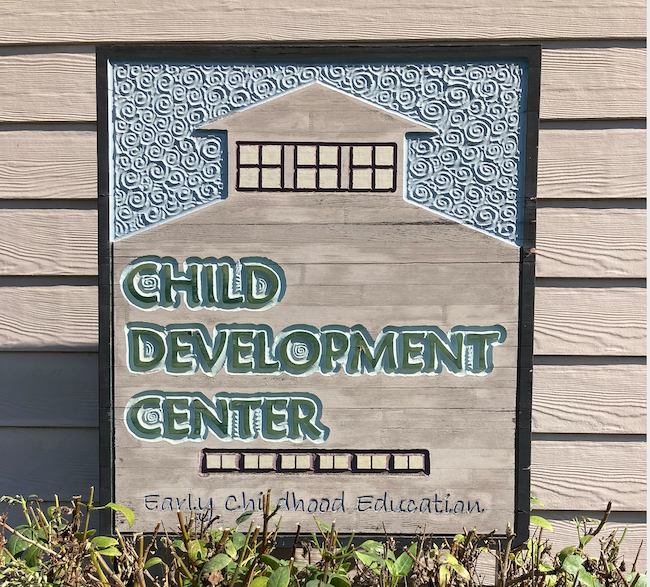
The Child Development Center at Chemeketa Community College (Courtesy photo)
The disruptions caused by the Covid pandemic haven’t been easy for anyone, but parents with young kids have been dealt an especially tough hand.
Chemeketa Community College’s early childhood educators want to help.
With the college’s child development center closed since the spring, instructors and college students have taken their offerings online through a family support program, with one-month sessions running through the fall. Families can sign in for virtual sing-alongs and story time that brings kids virtual music and storytelling, and helps parents find activities to do with their kids.
“Children are natural learners who learn best in a play-based environment and our goal is really to help support parents in taking on that role,” said Kelly Brader, an instructional specialist. “A child’s home is their first learning environment. Their parents are their first teachers.”
Since 1972, the college has run a Child Development Center. It’s a daycare and preschool program for kids age two-and-a-half to six, and a training ground for Chemeketa students in the early childhood education program, who get to practice what they’re learning in the classroom.
In the spring, when Oregon’s child care centers closed, the center had 39 kids enrolled. Brader and her colleague Natasha Schmunk reached out to parents who were suddenly isolated at home.
“They were really stressed and unsure and kind of wanted some continuing support and connection,” Brader said.
They decided to continue offering group meetings virtually, 10 to 15 minute sessions with music and stories.
“We would sing songs and try to engage families and children to sing along with us and read the stories. It works really well but it’s different,” Schmunk said.
This fall, they’ve opened two similar groups: one for parents of preschool-aged children, and one for kindergarten and early elementary school parents who want help making the most of virtual school.
For $40 per month, families will get a mix of help: live Zoom meetings where early childhood educators share information about child development and parents can trade questions and information with each other. The program is free for Chemeketa students receiving Pell grants who have young kids.
There are also live story and music sessions several times weekly for kids to participate in.
Parents don’t have to come to every session – they can choose what’s most useful for them and their kids, said Pam Ditterick, Chemeketa’s early childhood education department chair.
Each week, enrolled families get a sheet of activities to do at home with their child, tailored to the concerns and questions parents raise in the group. Chemeketa’s early childhood education students design those activities to be doable with minimal supplies, Ditterick said.
That could mean numbering the cells in an egg carton from one to 12 and having kids place that number of items in each cell to practice counting.
“Even though they’re playing, they are developing these skills which can hopefully help lower your stress level for families,” Ditterick said.
A recent list included having a young child help with folding laundry. Parents can help kids learn about colors, numbers and size through asking them to count all the green shirts, find matching socks or sort items by type or color.
“We’re not saying you need to plug in extra things,” Ditterick said. Instead, the goal is to help parents make normal household activities learning opportunities for their kids.
The instructors said a common concern they hear from families is that their kids will fall behind on academic and social skills while schools are operating remotely. Brader said it’s important for parents to remember that all kids are having a “normal” year disrupted.
“Children are resilient, and this is kind of a collective process that everyone is going through together,” she said. “When we do kind of get back to whatever the real world is going to be, we’ll all kind of have this shared experience.
Parents can help their kids by encouraging them to talk about their feelings and giving them opportunities for make-believe play.
“That’s a really important way for children to process their emotions and work through their concerns or worries that they have about things,” Brader said.
A new session of the center’s Preschool at Home and Kindergarten Support programs starts on Oct. 5. and runs through Oct. 31. Families can learn more and register by emailing [email protected].
SUPPORT ESSENTIAL REPORTING FOR SALEM – A subscription starts at $5 a month for around-the-clock access to stories and email alerts sent directly to you. Your support matters. Go HERE.
Contact reporter Rachel Alexander: [email protected] or 503-575-1241.

Rachel Alexander is Salem Reporter’s managing editor. She joined Salem Reporter when it was founded in 2018 and covers city news, education, nonprofits and a little bit of everything else. She’s been a journalist in Oregon and Washington for a decade. Outside of work, she’s a skater and board member with Salem’s Cherry City Roller Derby and can often be found with her nose buried in a book.









